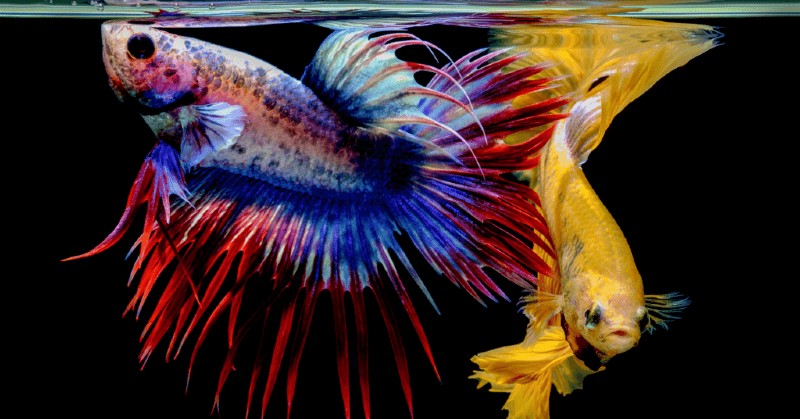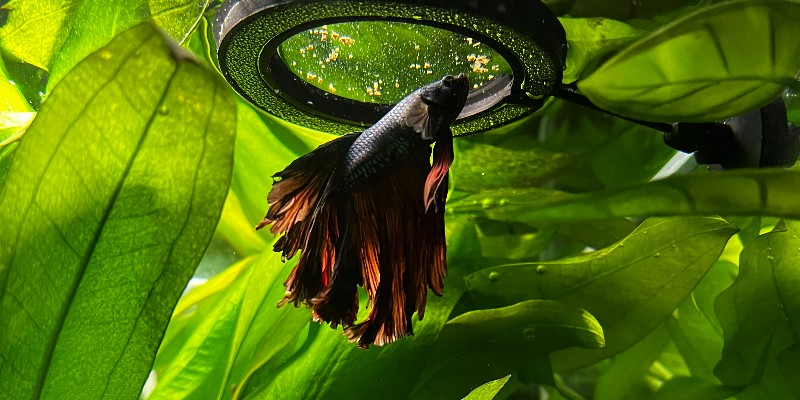You won’t always get a warning when your Betta fish is going to die, unfortunately. Sometimes it can seem quite sudden. But in most cases, there are signs in Betta fish behavior before death that you can look out for.
These may be treatable, to help you extend the life of your Betta fish, or it may be just a sign that the inevitable is happening so that you can prepare to say goodbye.
Read on to learn about the signs that might let you know that your Betta fish is unwell and could be close to death.
What does a dying Betta fish look like?
While there are many signs that a Betta fish is dying, the main thing to watch out for generally is a change in their behavior. Have they suddenly started spending most of their time hiding, or stopped eating? Have their swimming patterns changed and become more erratic?
Other signs that can let you know your Betta fish is suffering is a change in the fin length or discoloration on their body, including white or brown spotting. These are signs that your fish is very unwell.
You should be checking the tank’s parameters to make sure there are no possible causes that can be fixed, but be aware that eventually, your fish will pass away no matter how perfect their living conditions are.

What is the average lifespan of a Betta?
The average lifespan of a Betta fish is 2-4 years, although it’s possible for them to live longer, provided they are in the perfect conditions. Females tend to live slightly longer than males, and because they’re sold at a younger age, owners enjoy longer with a female Betta too.
Betta fish in the wild tend to have a shorter lifespan of around two years, mainly because of the stress of having to find their own food and the other fish species they have to compete with.
Captive Betta fish don’t have the same concerns, which is why they’re able to live a longer life on average.
Read more: Betta fish lifespan
Do Betta fish play dead?
Sometimes it can appear that your Betta fish is playing dead. In reality, they’re probably just sleeping – Betta fish are known for sleeping in unusual positions (including on their side or upside down) and appearing very still. Check the gills for signs of breathing if you’re concerned.
Some people online even claim that Betta fish will play dead to get some attention, but that’s unlikely. Betta fish are intelligent, but not to the point of emotional manipulation.
It’s important that you monitor your fish’s behavior though, because if they’re spending long periods of time ‘resting’ and hiding, and less time than usual swimming around, then it could be a sign that they’re sick.
Betta fish will sleep for an average of 12 hours a day, including naps, so don’t immediately panic if they spend time during the day ‘playing dead’.

Betta Fish Behavior Before Death
There are a number of signs you can look for when you’re concerned your Betta fish may be nearing death.
They won’t necessarily show all of these, and sometimes death can still seem like a sudden thing. But if you spot your Betta fish exhibiting a few of these behaviors then it could be worth paying attention to.
While these are the signs of Betta’s being close to death, how can you tell if your Betta fish is sleeping or dead already? It can be confusing since Betta fish do sleep in strange positions and seem perfectly still. But just check the gills behind the eyes. If you can see them moving at all, then your fish is alive and snoozing.
1. Lethargy
Betta fish do like to rest, but when they’re not taking it easy then they’re normally very active fish, and they like to have a lot of space to swim in. So if it seems like your Betta isn’t doing a whole lot of moving, and they’re acting quite lethargic, it might be cause for concern.
Why is my Betta fish not moving but still breathing?
If your fish is clearly awake but barely moving, and their breathing seems quite labored, it could be a sign of ammonia poisoning. Other potential causes include temperature shock. It might just be that they’re sleeping though – only worry if they’re not moving at all during the day.
It’s important to keep checking the water parameters of your Betta’s tank, especially after a water change. When your Betta is sitting at the bottom of the tank, or won’t swim or eat, this can tell you if there’s a problem.
If your fish is suffering from ammonia poisoning, it may be possible to save them. You’ll need to carry out a water change, and quickly – change 25% of the water and then retest it once it’s settled. You can use special ammonia removal products too:

If you’re struggling to lower the ammonia in your fish tank, you’ll find the answers in this comprehensive guide: How long does it take for ammonia levels to drop?
You can also change the water if you suspect temperature shock. Always aim to do a water change that’s as close to the current tank temperature, to avoid causing shock.
Read more: Betta Temperature Shock
2. Signs of Stress
Stress is a serious problem for fish – it has a physical impact and can shorten their life. But it can become a vicious cycle – a stressed fish will make themselves more sickly, which can cause them to stress more again too. Stress isn’t just a cause of death, but it’s also a sign that your fish could be struggling with other issues too.
What does a stressed Betta look like?
The most common sign of stress in a Betta fish is erratic swimming. Look for frenzied swimming patterns, or crashing into the bottom or sides of the tank. Betta fish are also known to eat less when they are suffering from stress.
Other signs of stress include clamped, rigid fins and your Betta fish hiding in the corner of the tank. Betta like to hide and rest occasionally, but excessive hiding is a sign that you have a stressed out or depressed Betta.
Stress can be triggered by a number of causes but usually, it’s poor quality water. Make sure you keep monitoring the parameters.

How long can a Betta fish go without water change?
You should be changing your Betta’s water every week, with a 10-15% change recommended. In large tanks with an excellent filter, they could maybe manage with a 2-3 week water change, as long as it wasn’t regular.
Snails make for a great tank mate for Betta fish since they don’t compete with them, but they also keep the tank free of algae by eating it. It’s not a sufficient replacement for water changes though – you still need to do those on the same timescale, ideally once a week.
Also, don’t change the water too frequently either. This has a higher risk of causing shock and stress in your fish, because the parameters of the water will always be changing subtly.
3. Uninterested in food
Betta fish can be voracious eaters and so any signs that they’ve lost interest in their food will usually tell you that something’s wrong. They will normally only avoid food if they’re not hungry, but if you know they haven’t been overfed then a lack of appetite is usually caused by illness.
How long can Betta fish go without food?
Betta fish are quite hardy, and can survive for up to 10 days without food. This isn’t recommended, and you should be feeding them small amounts every day. If your Betta has no appetite and refuses to eat for 10 days they will begin to starve.
If you can’t get your Betta to eat then make sure you’re looking for any other signs of illness. Test the tank water for any issues and consider a water change or medication.
4. Staying at Surface
There are a number of reasons that your Betta fish could be staying near the top of the tank, and some of them are serious. If you notice that your Betta fish is hovering close to the surface, then you’ll want to take action because something’s not right with them.

Why is my Betta fish just sitting at the top?
Betta fish stay at the surface of the tank if the water doesn’t have enough oxygen – they can breathe air, so will use the surface to get the oxygen they need. Other potential issues include swim bladder disease or ammonia poisoning.
There are less harmful causes too that could be the issue, and you’ll want to solve them regardless. A Betta fish might stay near the surface if the tank is overcrowded – either because there are too many other fish in there, or it’s just not big enough. Or they might just want more food – they’re smart enough to know that food comes from the surface when you feed them.
So, if you notice your Betta fish is staying close to the surface, your first step is to use a water testing kit to make sure the oxygen and ammonia levels are within an acceptable range. Once you’ve ruled out those issues, it’s time to look at whether you need to split your Betta from some tankmates, or if the aquarium is big enough at all. Once you’ve worked through these issues, maybe they just need a bit more food.
Note: Bettas will naturally spend more time at the top of the tank than anywhere else, but if they’re not exploring the lower areas at all and they look distressed, it could be time to take action.

5. Fading Colors
Over time, Betta fish will naturally lose their color and when that happens, you just know that they’re getting older and entering their mature period of life. However, if you think it’s happening a little earlier than you’d expect, or it happens alongside other signs of worry, then you might be able to reverse it.
Why is my Betta fading?
Bettas fade with old age, but they can also lose color if they are ill or stressed. Also if a Betta is injured, fins can regrow without some of their usual color. Use a water testing kit to rule out issues with water parameters if you’re concerned about premature fading.
If everything looks fine and your fish isn’t exhibiting signs of stress, then it looks like your Betta is just nearing the end of its natural life. It won’t necessarily be imminent, but it’s just a sign that they’re in their twilight phase.
Can you tell how old a Betta fish is?
Due to their short lifespan, you can’t narrow down a Betta fish’s age too much. But there are some signs. Young Betta fish have stripes and translucent fins. Adult Betta fish are full size (2-3) inches and have full-color fins. Older Betta have humped backs and dull fins.
Do male or female bettas live longer?
Female Betta fish tend to live longer than males, although the difference is usually just a few months. The average for Bettas – male or female – is 2-4 years. Females ‘appear’ to live longer in captivity because they’re sold at a younger age – 6 months, compared to 1 year for males.

6. Laying on tank floor
Seeing your Betta laying on the tank floor for short periods of time is relatively normal. They enjoy a rest and will quite happily sleep there, or use the floor as a place to just relax for a little while. If you notice that they’re spending more and more time down there though, then it could be that age is catching up to them.
Why is my Betta fish laying on the bottom of the tank?
Potential reasons for a Betta fish laying at the bottom of a tank excessively include ammonia poisoning and swim bladder disease. But they may just be tired – which is a common sign of old age in Betta fish.
If your testing shows everything in the water as being suitable for your Betta fish, exhaustion is probably the cause and that’s normally due to them getting older and needing more time to rest. They just won’t be as energetic when they’re older.
There is one other potential cause though, rare as it may be. If you’ve bought too powerful a filter for a smaller tank, you might’ve accidentally created a strong current which is tiring out your Betta. Despite their large fins, they’re not excessively strong swimmers. Just something that’s worth ruling out if you think your Betta shouldn’t be getting tired.
7. Isolation
If you keep your Betta fish with other tank mates, it will normally be quite happy to swim amongst them, providing it does have spaces to have some downtime too.
But if you’re wondering why your Betta fish is hiding and not swimming, and it’s becoming a recurring issue, then it could be due to them either feeling overcrowded or stressed. Or, it could be another sign that they’re unwell and don’t want to interact with other fish.
But also, as Betta fish get older, they tend to isolate themselves more naturally. Once you’ve ruled out other potential causes, it may just be that your Betta is spending more time alone as they prepare for the end of their life.

8. Swollen body
Betta fish do go through some bodily changes as they get older, including often getting a humped back. But a swollen body tends to be a sign of something else, including several illnesses that are often serious.
A swollen body in Betta fish can be a sign of pregnancy but is often a sign of constipation, swim bladder disease, or dropsy. Constipation and swim bladder disease are more easily treatable but dropsy is usually fatal, even with prompt action.
If you notice your Betta has a swollen belly, make sure you’re checking their water quality daily and that the tank is clean. Check the food you’re giving them – they’ll need high-quality food to recover. Constipation can be solved with fasting, while swim bladder disease has dedicated medication available.
Dropsy is more difficult to deal with. It can sometimes be cured with antibiotics but you’ll need to monitor your fish extremely carefully, and ideally put them into a hospital tank away from any other fish. Even then, dropsy is often terminal.
9. Limp tail fin
If your Betta fish has a tail fin that is curling and droopy, it may be a sign of old age but also it can be caused by stress or a problem with your fish’s immune system. It could also be fin rot, which is caused by poor water conditions.
Read more: How long does water conditioner take to work?
Look for the edges of your fish’s fin to see if they look ragged and torn, or irritated. That’s normally a sign of fin rot, and there are some treatments that you can buy. Otherwise, just make sure you’re testing the water regularly to check for any issues.

How can I help my dying Betta fish?
A lot of illnesses and problems with Betta fish that can lead to death are caused by stress or by poor water quality. If you notice any changes in your Betta’s behavior, increase the frequency that you’re testing the water, and make any changes that could reduce stress.
These include making sure the Betta has enough space to swim freely, and also some good hiding spots. You’ll also want to avoid overcrowding with too many tank mates.
If your Betta fish appears to be dying due to old age, there’s not a lot you can do to help them. Just make sure that you maintain their water quality as best as you can, and feed them high-quality foods.
Read more: Ultimate guide to feeding your Betta (best Betta foods)
Summary
As long as you buy a reliable water testing kit, it’s easy to keep tabs on your Betta fish’s tank to avoid many common problems. Use it every few days, and if you notice any problems then you can test more frequently.

You should be doing partial water changes anyway every week or so. But, if you notice a problem with the oxygen, ammonia, or nitrate levels, bring forward your next water change.
Don’t suddenly change too much, you should still stick to 10-15% changes, but you can do them more frequently if it’s not fixing the problem immediately. Also, consider heading to your local pet store to buy any agents that can help to lower ammonia or nitrates.
Keeping the water quality in ideal conditions, and feeding your Betta healthy foods, is the best way to look after them. And once they reach old age, you’ll now know the signs so that you’ll at least know the inevitable is coming.

I’ve had Rainbow for a little over a year, so he’s still quite young and should have another couple of years in him yet! But remember that a fish dying of old age means that they’ve enjoyed a good life where they’ve been well cared for, so you should be happy that you’ve been able to provide that quality of life for your fish.
